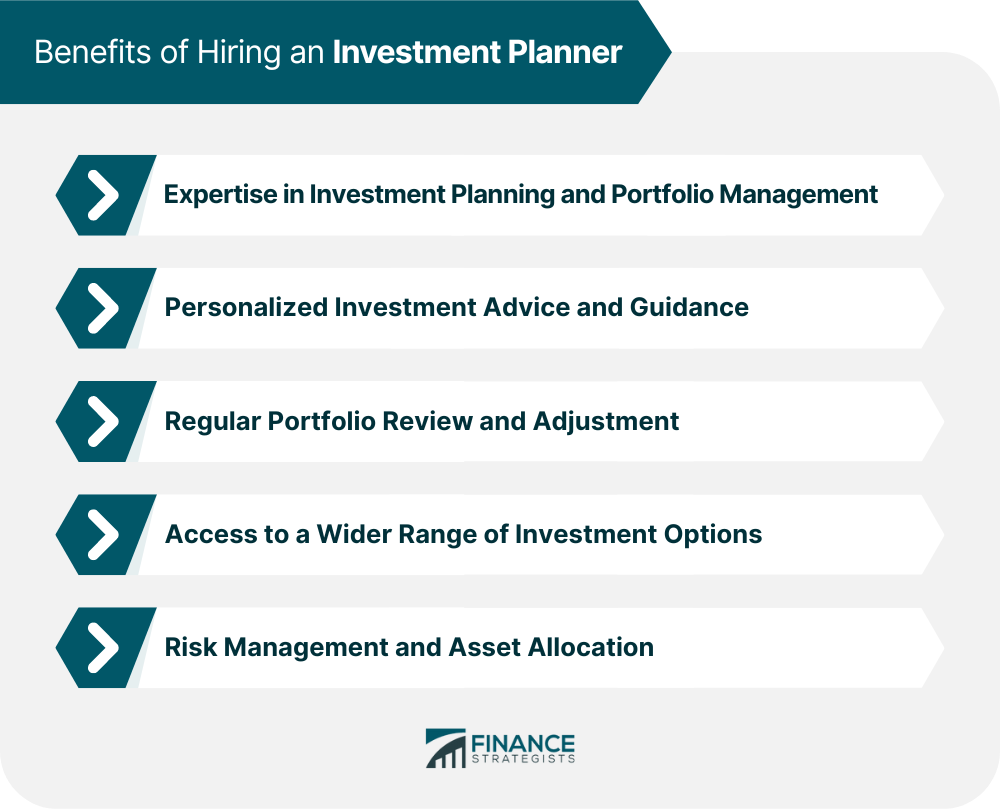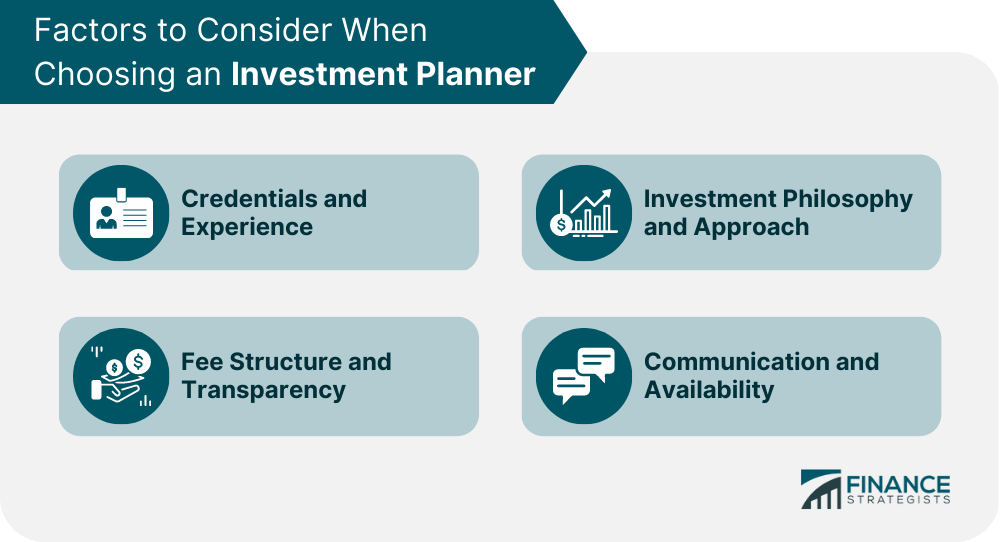An investment planner is a professional who provides expert guidance and advice on investment planning and portfolio management. An investment planner can be an essential partner in creating a successful investment plan, helping you to navigate the complex world of investing and develop a strategy that aligns with your financial goals. Have a question for an Investment Planner? Click here. While anyone can benefit from their services, certain groups of people stand to gain the most from hiring an investment planner. Investing can seem daunting and complex, especially for beginners. An investment planner can simplify the process and guide the fundamentals of investing, such as various investment options, risk and reward, and the significance of diversification. If you want to grow your wealth through investing, an investment planner can help you develop a strategy that aligns with your financial goals. As you approach retirement age, your investment strategy must shift towards preserving your capital and generating income. An investment planner can help you develop a plan that prioritizes these goals while managing risk. Small business owners often have unique investment needs, including managing cash flow, planning for growth, and building a retirement plan. Corporations and institutional investors have complex investment needs, including managing large portfolios, evaluating risk, and optimizing returns. Hiring an investment planner can offer a range of benefits for individuals looking to grow and manage their finances. Investment planners are experts in their field, with a deep understanding of the financial markets, investment options, and risk management strategies. An investment planner can provide personalized advice and guidance that considers your unique financial situation, risk tolerance, and investment goals. An investment plan is not a set-it-and-forget-it proposition. Markets change, and so do your financial goals. Investment planners can access various investment options, including stocks, bonds, mutual funds, and alternative investments. They can help you diversify your portfolio and take advantage of investment opportunities you may need access. Managing risk and diversifying your portfolio are critical to successful investing. Here are essential factors to consider when choosing an investment planner: When choosing an investment planner, it is important to consider their credentials and experience. Investment planners can be compensated in a variety of ways, including through commissions, fees, or a combination of both. Every investment planner will have their own unique investment philosophy and approach. Make sure to understand their approach and make sure it aligns with your financial goals and risk tolerance. It's important to work with an investment planner who communicates effectively and is available to answer your questions and concerns. Working with an investment planner can provide you with the guidance and support you need to manage and grow your investments effectively. Before working with an investment planner, it's important to define your investment goals and objectives. Based on your investment goals and objectives, your investment planner will develop a strategy and plan that includes a diversified portfolio of investments. As mentioned earlier, investment plans need to be regularly reviewed and adjusted to ensure they continue to align with your goals and meet your changing needs. Your investment planner will also monitor the performance of your investments and provide regular reports on how your investments are performing compared to your goals. They will also help you understand the impact of market volatility on your portfolio. Finally, your investment planner will help you adjust your investment plan as your financial goals and life circumstances change. Choosing to work with an investment planner can help you manage and grow your investments effectively, mitigate risks, and achieve your financial goals. Take the first step and schedule a consultation to discuss your investment goals and how an investment planner can help you achieve them.What Is an Investment Planner?
Who Needs an Investment Planner?
Individuals With Little to No Investment Experience
Individuals Looking To Maximize Their Investment Returns
In addition, they can provide expert guidance on which types of investments to choose, how to balance your portfolio, and when to buy and sell.Individuals Approaching Retirement Age
Small Business Owners
An investment planner can help you navigate these challenges and provide guidance on tax-efficient investment strategies and risk management.Corporations and Institutional Investors
An investment planner can provide the expertise and guidance needed to develop an investment strategy that aligns with the organization's financial goals.Benefits of Hiring an Investment Planner
Expertise in Investment Planning and Portfolio Management
They can provide valuable insights and guidance on developing an investment plan that aligns with your financial goals.Personalized Investment Advice and Guidance
They can help you navigate the complexities of investing and make informed decisions that align with your long-term financial goals.Regular Portfolio Review and Adjustment
An planner can regularly review and adjust your investment plan to ensure it continues aligning with your goals and meeting your changing needs.Access to a Wider Range of Investment Options
Risk Management and Asset Allocation
An investment planner can help you develop a risk management strategy that aligns with your financial goals and tolerance for risk. They can also help you allocate your assets to maximize returns while managing risk.
How to Choose an Investment Planner
Credentials and Experience
Look for those with a professional designation, such as a Certified Financial Planner (CFP) or Chartered Financial Analyst (CFA), as these designations indicate a certain level of expertise and knowledge.
Additionally, consider the planner's experience working with clients with similar financial goals and situations as yours.Fee Structure and Transparency
Make sure to understand how your planner will be compensated and what fees you can expect to pay.
Additionally, look for transparency in their fee structure and make sure they are disclosing any potential conflicts of interest.Investment Philosophy and Approach
For example, if you are risk-averse, you may want to work with a planner who prioritizes capital preservation over high-risk investments.Communication and Availability
Make sure to understand their availability and preferred communication channels, whether that be email, phone, or in-person meetings.
Working With an Investment Planner
Setting Investment Goals and Objectives
This includes understanding your risk tolerance, desired investment returns, and investment time horizon. Your investment planner can help you clarify these goals and develop a strategy to achieve them.Developing an Investment Strategy and Plan
They will also help you understand the risks and potential returns associated with each investment.Regular Portfolio Review and Rebalancing
Your investment planner will review your portfolio on a regular basis and make adjustments as needed.Monitoring Investment Performance
Adjusting the Investment Plan as Needed
This includes making changes to your investment strategy, rebalancing your portfolio, and adjusting your risk tolerance as needed.Final Thoughts
An investment planner can provide guidance on investment strategies, assess your risk tolerance, and develop a tailored plan that aligns with your financial objectives.
By working with an investment planner, you can save time and money while avoiding common investment pitfalls. So if you are looking to grow your wealth and secure your financial future, consider hiring the services of an investment planner today.
Investment Planner FAQs
An investment planner is a financial professional who helps individuals manage their investments to achieve their financial goals. They bring specialized knowledge and experience to the table and can provide guidance on investment strategies, risk management, and portfolio diversification.
Working with an investment planner can offer several benefits, such as expert guidance on investment strategies, access to specialized resources, and personalized investment planning that aligns with your financial goals.
To choose the right investment planner, you should consider factors such as their experience, qualifications, fees, and the services they offer. It's also essential to evaluate their communication skills and make sure you feel comfortable working with them.
During your first consultation with an investment planner, they will likely ask questions about your financial goals, investment experience, risk tolerance, and other factors that can affect your investment strategy. They may also explain their services, fees, and the investment planning process.
The costs of hiring an investment planner can vary depending on several factors, such as the planner's experience, the services they offer, and the size of your investment portfolio. Investment planners typically charge a percentage of assets under management or an hourly fee. It's essential to discuss fees with your investment planner and make sure you understand the costs associated with their services.
True Tamplin is a published author, public speaker, CEO of UpDigital, and founder of Finance Strategists.
True is a Certified Educator in Personal Finance (CEPF®), author of The Handy Financial Ratios Guide, a member of the Society for Advancing Business Editing and Writing, contributes to his financial education site, Finance Strategists, and has spoken to various financial communities such as the CFA Institute, as well as university students like his Alma mater, Biola University, where he received a bachelor of science in business and data analytics.
To learn more about True, visit his personal website or view his author profiles on Amazon, Nasdaq and Forbes.











